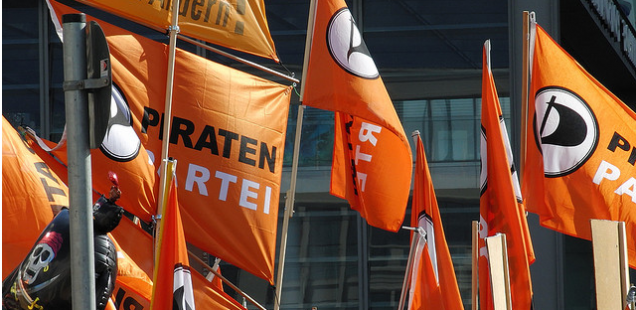Amidst Prism & Tempora Scandal, German Pirates Get Back | PirateTimes

Amidst #Prism and #Tempora Scandals, German Pirates Get Their Groove Back
After a year of internal discord and coordinated work to broaden their political platform, the German Pirates are now focusing on campaigning for the federal election this coming 22 September 2013. Critical media reports have voiced dismay over the lack of internal organization, as well as the very public “shitstorms” on twitter and through other media. Both of these factors have resulted from last year’s hype, during which the Pirate Party Germany polled as high as 12% nation-wide, to PPDE’s collapse, leaving the polls stagnant between 2-4%.
So what does this mean for the German Pirate’s election campaign? The rise in membership and public perception began in 2009, when the issue of internet censorship was brought up in Germany over a debate on child pornography, and culminated during the world wide protests against ACTA. Because of this many Pirates and sympathizers felt that the Party needs to head back to their core issues: privacy, open data, a strong stance against surveillance and the resulting infringement on civil rights. A survey that was conducted in February among party members, shortly after the resounding failure to clear the 5% hurdle and to get into state parliament of the Pirates in Lower Saxony, revealed something interesting in this regard. While most Pirates know full well that the ongoing Euro-crisis and the problems of the aging social welfare state will be some of the most discussed problems of the political debate leading up to the election, the majority of Pirates still wants to run a campaign based on the party’s core issues of civil and digital rights.
The problem with core-issues
What sounds like a logical step, given the Pirate’s rise in popularity around these topics, is in fact not easy to pull off in Germany. Three main factors hinder a successful campaign, that would rely solely on digital issues and their civil rights implications.
Firstly, the majority of German voters are over 50 years old, while most of the younger voters between the ages of 18 to 25, refrain from voting at all. And while older Germans use the internet frequently, it is hard to communicate the urgency of issues, such a Net-neutrality and Big Data. Most of these older voters use their online communication more as a one-on-one tool, for example sending emails instead of letters. The level of social networking and organization that younger people have cultivated online internationally, is often-times seen as a problem („internet addiction“ etc.) rather than a way of life, that is endangered by restrictive measures by companies, or surveillance by governments.
Secondly, when digital rights and issues are discussed, it very rarely happens in the general public sphere but rather online, or amongst Internet-activists. This leaves the discussion in a bubble of twitter, facebook groups, blogs and conventions which are completely set apart from mainstream media who caters towards an older demographical group. This makes it hard for the Pirate Party to set the public debate and to highlight those issues, the areas where they are more competent and skilled than the other political parties.
Thirdly, while the Pirate Party initially was the logical political home for internet activists, many of them have voiced strong criticism of the Pirates for abandoning their core platform, in favor of broadening their political scope and appeal to the public at large. This criticism is not entirely unfounded, however, it has to be said that since the world-wide protest movements against ACTA, internet activism lacked a cause fundamental enough to rally activists across borders and party lines.
Hopes for a comeback
This diffusion of interests and public debate surrounding internet issues, has abruptly come to an end with the recent revelations of whistle-blower Edward Snowden. The Pirates used to be more or less indulged and patronized for their fear of Orwellian government surveillance. This changed with the news about the US-surveillance program PRISM and it’s even further reaching British counterpart TEMPORA, which have both have justified the Pirates’ harping on the issue of privacy in the digital age. While many Pirates were nonetheless shocked, that their worst fears are, in fact, justified, all of them draw new energy from the news. The German Pirate Party will not make anyone forget that the other political parties in Germany, were either wilfully compliant and silent on the extent of internet surveillance, or just completely unaware.
So Pirates take to the streets once more, organizing demonstrations not just amongst themselves, but also across party lines. Online they participated in creating and ratified an international manifesto, that details the global Pirate Parties’ demands to increase online data protection and an end to the persecution of Edward Snowden (www.antiPRISM.eu) An online Petition, filed by Anke Domscheit-Berg, who is a candidate in the upcoming election, had already collected over 40,000 signatures in less than one week. In it, the member of the German Pirate Party demanded, that Angela Merkel address #PRISM during US President Obama’s visit to Berlin last week.
The issue of surveillance might just be the platform the Pirate Party needed to revive it’s core strengths their youthfulness compared to the other parties, their familiarity with new media and issues surrounding the digital age, and their technical know-how when it comes to making government more easily accessible and transparent to its population through Open Data and Open Access.
The struggle for mobilization
However, the problems outlined earlier remain. If the German Pirates can maintain, or even ignite, the population’s interest, their chances of mobilizing enough voters to get them into parliament are good. However, in a country, where many people respond to PRISM with “Why should I care, if I have nothing to hide” and the fear of terrorist attacks has been used to justify the restriction of civil liberties, this is not without difficulty. On the other hand, Germany’s particular history of state surveillance by the Stasi in East Germany, makes the issue more accessible to voters there, than in the UK.
What will make or break this election for the German Pirate Party hinges on whether they are capable of obtaining the public support of political activists, while still remaining at the forefront of the protests media coverage. Many activists have grown tired of supporting a political party that seemed intent on just dealing with its internal issues. The recent revelations on just how far reaching government surveillance is, could be significant enough to mend those bridges for the sake of an issue that is, ultimately, far more important than the upcoming election.

About Felicitas Steinhoff
I recently moved back to Germany, after having lived in Santa Fe (BA St. John’s College), Morocco (MA in International Relations Al Akhawayn University) and Boston. In Boston, I worked with Grassroots Camapaigns to raise awareness and funds for organizations such as the ACLU, Oxfam and Planned Parenthood. While in Boston, Dewey Square was occupied and I attended a meeting of the Pirate Party MA, which very much shaped my current outlook on participatory democracy and transparent politics.
Now, back in Germany in the picturesque town of Hildesheim, I’m the assistant secretary of the Pirate Party Fraction in our city council, do some translation work and tutoring in English, German and Latin.
All content is CC-BY if not mentioned otherwise. Please link back to us if using content.
-
- Pingback: High Hopes for the German Pirates on Sunday’s Election | PirateTimes()















Recent Comments